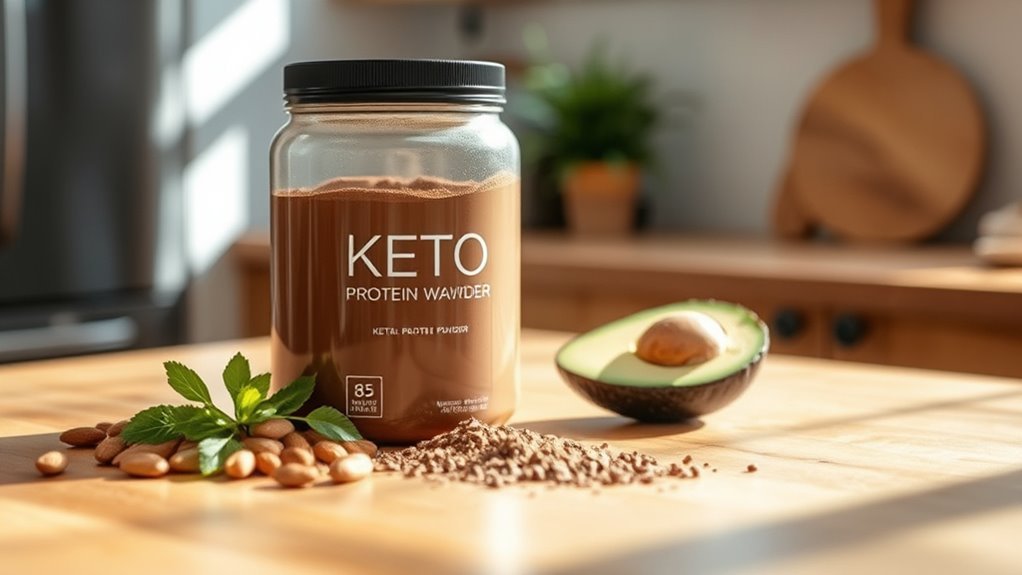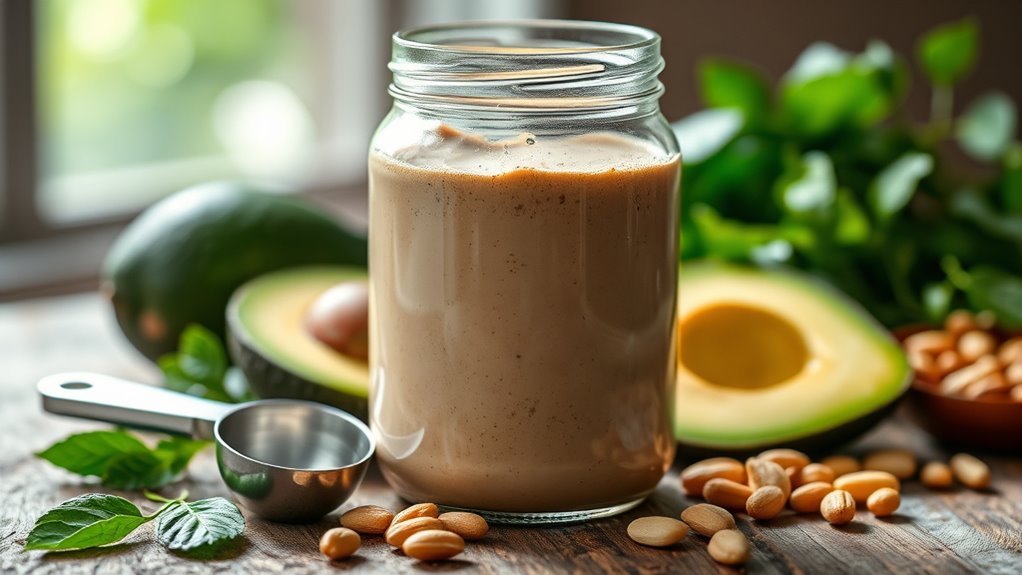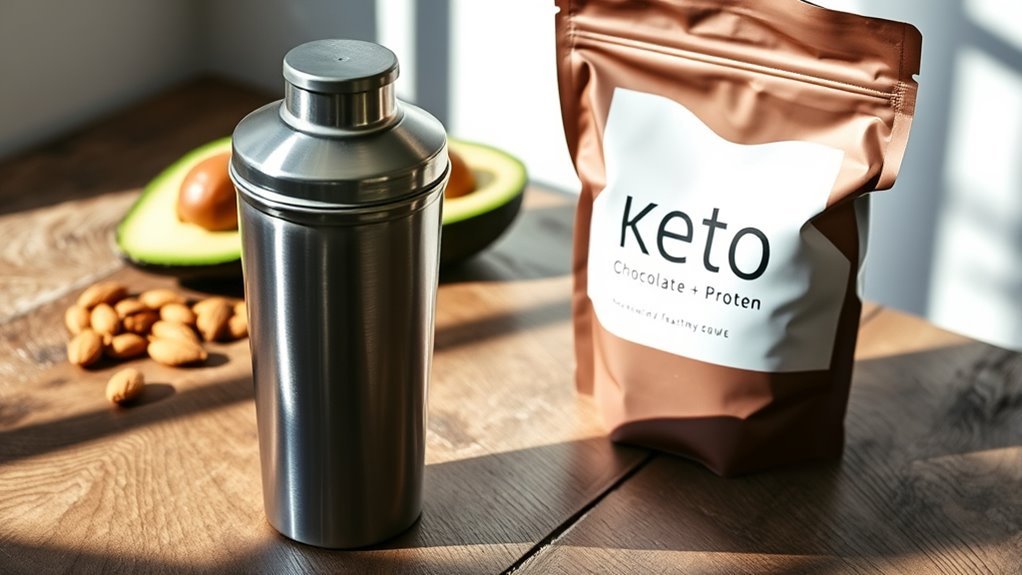Yes, protein powder can fit into your keto diet if you choose wisely. Look for low-carb, high-fat options to maintain your macronutrient balance. Whey protein isolate is a great choice due to its low carb content and high bioavailability. Always check labels for hidden carbs, and monitor your overall intake to avoid disrupting ketosis. Plus, be mindful of any digestive issues from overconsumption. There’s more to discover about selecting the best protein options for your keto lifestyle.
Understanding the Keto Diet Basics

When you explore the keto diet, you’ll find it’s fundamentally a high-fat, low-carbohydrate eating plan designed to shift your body’s metabolism into ketosis. This metabolic state enables your body to burn fat for fuel instead of carbohydrates. To effectively embrace this lifestyle, keto meal prep becomes essential, helping you plan and prepare meals that align with your dietary goals. Incorporating low carb snacks into your daily routine can keep your energy levels stable and cravings at bay. These snacks can include nuts, cheese, or avocado, which not only maintain your ketosis but also provide essential nutrients. By mastering meal prep and choosing the right snacks, you’re empowering yourself to enjoy the freedoms of a keto lifestyle while achieving your health objectives.
The Role of Protein in a Keto Diet

In a keto diet, protein intake plays a vital role in maintaining muscle mass while you’re in a state of ketosis. You need to balance your macronutrient ratios carefully, as too much protein can kick you out of ketosis, while too little can hinder muscle preservation. Understanding how to optimize your protein consumption is essential for achieving your keto goals effectively.
Importance of Protein Intake
Although many people associate the ketogenic diet primarily with high fat intake, protein plays a crucial role in its success. Adequate protein intake is essential for maintaining muscle mass, especially when your body is burning fat for fuel. Your daily requirements for protein can vary based on factors like activity level and weight, but generally, aiming for 20-30% of your total caloric intake from protein is a good rule of thumb. Focusing on quality protein sources—such as meat, fish, eggs, and plant-based options—ensures you’re getting the nutrients necessary to support your body’s functions. This balance helps prevent muscle loss while allowing your body to thrive in a state of ketosis, giving you both energy and freedom in your dietary choices.
Balancing Macronutrient Ratios
Getting the macronutrient ratios right is key to the effectiveness of a ketogenic diet. Protein plays an essential role, but it needs to be balanced with fats and carbohydrates. You’ll want to focus on macronutrient tracking to guarantee you’re hitting the right ratios.
- Aim for approximately 70-75% fats, 20-25% protein, and 5-10% carbs.
- Make dietary adjustments based on your energy levels and weight loss goals.
- Monitor how your body responds to different protein sources, including protein powders.
When you find the right balance, you can enjoy the freedom of a keto lifestyle while still meeting your nutritional needs. Remember, it’s all about finding what works best for you!
Types of Protein Powders Available

When considering protein powders, you’ll often encounter whey protein isolate and various plant-based options. Whey protein isolate is a popular choice due to its high bioavailability and low carb content, making it suitable for a keto diet. On the other hand, plant-based proteins can provide essential nutrients and are ideal for those seeking vegan alternatives, but it’s important to check their carb levels.
Whey Protein Isolate
Whey protein isolate, renowned for its high protein content and low carbohydrate levels, is an excellent choice for those following a ketogenic diet. Its isolate purity makes it one of the most effective protein powders available, offering numerous whey benefits that align with your keto goals. Here are a few key features:
- High Protein Content: Contains around 90% protein, essential for muscle maintenance.
- Low Carbohydrates: Often less than 1 gram per serving, keeping you in ketosis.
- Fast Absorption: Quickly digested, providing immediate amino acids for recovery.
Incorporating whey protein isolate into your diet can enhance your nutritional intake while supporting your ketogenic lifestyle, empowering you to achieve your health and fitness objectives with ease.
Plant-Based Protein Options
Many people exploring plant-based protein options find a variety of powders that cater to their dietary needs while supporting a ketogenic lifestyle. Soy protein is a popular choice due to its complete amino acid profile, making it a great option for muscle recovery and growth. However, some may have concerns about soy’s estrogenic effects, so it’s important to weigh the pros and cons. Pea protein, on the other hand, is a fantastic alternative, offering a high protein content and being hypoallergenic. It’s also easily digestible, ensuring you won’t experience discomfort. Both options can be incorporated into smoothies or baked goods, allowing you to maintain your keto goals while enjoying plant-based benefits. Choose wisely based on your preferences and nutritional requirements.
Evaluating Carb Content in Protein Powders
Although protein powders can be a convenient supplement for those following a ketogenic diet, assessing their carbohydrate content is essential. Different protein types can greatly vary in carb sources, impacting your daily intake. Here’s what to take into account:
- Type of Protein: Whey, casein, and plant-based proteins often have different carb levels.
- Added Ingredients: Flavorings, sweeteners, and fillers can increase carb content unexpectedly.
- Serving Size: Always check the serving size to accurately assess total carbs per scoop.
Best Protein Powder Options for Keto
When you’re following a ketogenic diet, selecting the right protein powder can make a significant difference in maintaining your macro balance. Look for protein powders that are low in carbohydrates and high in healthy fats. Options like whey isolate or collagen peptides are great choices, as they typically have minimal carbs. Many brands now offer various flavor options, from chocolate to vanilla, allowing you to satisfy your taste buds without derailing your diet. Additionally, consider protein blends that combine different sources, as they can provide a broader amino acid profile, enhancing your overall nutrition. By choosing wisely, you can enjoy your protein powder while staying true to your keto lifestyle, empowering you to reach your health goals.
How to Incorporate Protein Powder Into Your Keto Diet
Incorporating protein powder into your keto diet can be straightforward and beneficial for meeting your nutritional needs. Here are a few effective ways to do it:
- Keto-friendly smoothies: Blend protein powder with low-carb vegetables, unsweetened almond milk, and healthy fats like avocado for a satisfying drink.
- Protein powder recipes: Use protein powder in baking keto-friendly snacks, such as muffins or pancakes, to boost your protein intake without adding carbs.
- Meal replacement options: Mix protein powder with coconut oil or heavy cream for a quick, low-carb meal that helps keep you full.
Potential Risks of Using Protein Powder on Keto
While protein powder can be a convenient addition to your keto diet, it’s not without its potential risks. You might face digestive issues, such as bloating or gas, especially if you’re sensitive to flavor additives or have potential allergies. The protein quality matters too; low-quality powders can negatively impact nutrient absorption. Overconsumption risks arise if you rely solely on protein powders, potentially leading to increased blood sugar levels and kidney strain over time. Plus, relying too much on supplements can affect your satiety levels, leaving you feeling less full. Consider the long-term effects of your choices and guarantee a balanced intake of whole foods.
| Risk | Description | Considerations |
|---|---|---|
| Allergies | Reactions to ingredients | Check labels for allergens |
| Digestive Issues | Bloating, gas | Start with small servings |
| Protein Quality | Impact on nutrient absorption | Opt for high-quality sources |
| Overconsumption Risks | Kidney strain, blood sugar spikes | Monitor intake closely |
Frequently Asked Questions
Can Protein Powder Kick Me Out of Ketosis?
Yes, protein powder can kick you out of ketosis if you’re not careful. Certain protein types, like whey, contain more carbohydrates than others, which can disrupt your keto guidelines. When choosing a protein powder, opt for low-carb options, such as collagen or plant-based proteins with minimal sugars. Always check the labels to guarantee you’re staying within your carb limits, allowing you to enjoy the benefits of protein while maintaining your ketogenic lifestyle.
How Much Protein Should I Consume on Keto?
Finding the right balance of protein on keto is like walking a tightrope; too much can tip you out of ketosis. Generally, you should aim for about 20-25% of your daily caloric intake from protein. This typically translates to around 1.2 to 2.0 grams of protein per kilogram of body weight, depending on your activity level. Sticking to these keto guidelines will help guarantee you maintain energy while supporting muscle maintenance.
Are Plant-Based Protein Powders Keto-Friendly?
Yes, many plant-based protein powders can be keto-friendly. When choosing, focus on protein quality and the specific plant sources used, like hemp, pea, or pumpkin seed. These sources often have lower carbohydrates compared to others, making them suitable for a ketogenic diet. Just be mindful of added sugars or fillers in some products, as they can spike your carb intake. Always check labels to verify they align with your keto goals.
Can I Use Protein Powder for Meal Replacements on Keto?
You can absolutely use protein powder as a meal replacement on keto, much like a lighthouse guiding your dietary choices. Different protein powder types, such as whey or collagen, can offer great meal replacement options, depending on your nutritional needs. Just verify the powder aligns with your carb limits to maintain ketosis. Balancing flavors and textures will help you savor each sip while staying committed to your keto journey, allowing for both satisfaction and freedom.
What Sweeteners Are Safe in Keto Protein Powders?
When choosing keto protein powders, you’ve got some great sweetener options. Look for natural alternatives like stevia, erythritol, and monk fruit, which won’t spike your blood sugar. These sweeteners are generally considered safe and can enhance flavor without adding carbs. Always check labels, as some products might include hidden sugars. By opting for these alternatives, you can enjoy your protein shakes while staying true to your keto lifestyle.
Frequently Asked Questions about Protein Powder and Keto
1. Can I use protein powder on a keto diet?
Yes, you can use protein powder on a keto diet, but it’s essential to choose the right type. Look for protein powders that are low in carbohydrates and sugar. Whey isolate, collagen, and plant-based protein powders are often the best options, as they typically contain minimal carbs and fit well into a ketogenic lifestyle.
2. What should I look for in a keto-friendly protein powder?
When selecting a keto-friendly protein powder, check the nutrition label for total carbohydrates and sugars. Aim for protein powders that contain less than 5 grams of net carbs per serving. Additionally, avoid those with added sugars or fillers that can increase carb content. Ingredients like whey protein isolate, egg protein, or collagen are suitable choices.
3. Are there any protein powders I should avoid on keto?
Yes, it’s advisable to avoid protein powders that contain high amounts of carbohydrates. This includes many mass gainers, protein blends with added sugars, and certain plant-based proteins that can have higher carb counts, like brown rice protein. Always read labels to ensure the product aligns with your keto goals.
4. How can I incorporate protein powder into my keto diet?
You can incorporate protein powder into your keto diet in various ways. Consider adding it to smoothies with low-carb vegetables, mixing it into your morning coffee, or using it in keto-friendly baked goods. It can also be used to create protein-rich snacks or meals, helping you meet your protein needs while staying within your carb limits.
5. Can protein powder help with muscle maintenance on a keto diet?
Absolutely! Protein powder can be a valuable tool for muscle maintenance on a keto diet, especially if you are active or engage in strength training. Consuming adequate protein helps prevent muscle loss that can occur during weight loss. Ensure you are meeting your daily protein requirements while keeping your carb intake low to support both muscle retention and ketosis.
References
- https://www.ncbi.nlm.nih.gov/pmc/articles/PMC7072971/
- https://www.healthline.com/nutrition/protein-powder-keto
- https://www.medicalnewstoday.com/articles/protein-powder-and-keto
- https://www.wisewell.com/blogs/news/keto-diet-and-protein-powder
- https://www.verywellfit.com/protein-powder-and-the-keto-diet-5184837
- https://www.dietdoctor.com/low-carb/protein-powder
- https://www.ketoconnect.net/is-protein-powder-keto-friendly/


